- Home
- Taylor Caldwell
The Turnbulls
The Turnbulls Read online
The Turnbulls
A Novel
Taylor Caldwell
To my dear children
BOOK ONE
CHAPTER 1
On a certain cold gray morning, wet and misty, (December 15, 1850, in fact) a young man of about eighteen years turned in at Russell Square, whistling abstractedly to himself. The whistling was low, impatient yet thoughtful, and his black eyes were almost obscured by his thick frowning black eyebrows. He was somewhat above middle height, with a well-made and compact body, enhanced by a youthful swagger, and conscious of a fine new wardrobe. Only his general air of robust masculinity saved him from a secret dandyism, for he was extremely fond of excellent dress and the latest fashion. Even his abstracted thoughts returned at intervals to his buff greatcoat, (bought that very morning) with its three tiers of capes. He fingered the good stuff with his gloved hand, and as he did so, his sullen expression became more lively. In truth, sullenness sat uneasily on that handsome countenance, somewhat broad and dark-skinned, with an alert shrewd look full of intelligence, and touched with more than a little gay and ruthless brutality. His features, too, were broad and short, hinting of the Celt rather than the Englishman in a wide and vigorous nose, the slight tilt of his lively and restless eyes with their strong mobile brows, the firm full chin with its dimple, and the breadth of the cheek-bones. Youth, health, high spirits, simple selfishness and humour combined to make that countenance very prepossessing especially when something amusing made him part his somewhat heavy lips to reveal two rows of large and dazzling white teeth, enhanced immeasurably by the general darkness of his skin. If his face lacked subtlety and great intellect, the casual observer did not care, so full of latent laughter and deviltry was the whole expression.
He walked carefully, for all his speed and swagger, for the darker buff broadcloth pantaloons, (rather full and very long over the instep, secured by straps under the polished black boots) were also shining with newness, and the streets were livid with the running water of a recent downpour. Under the greatcoat was a flowered silk waistcoat, and a well-cut jacket with long tails, to match the pantaloons. His stiff white frills seemed made of polished and fluted ivory; they were secured by a full black silk stock, carefully folded and knotted, and completed by the bland shining of a smooth pink pearl pin. He had a big round head, profusely covered by short black curls, and rakishly disposed upon them was a tall and gleaming hat. He carried a black malacca cane with a gold head, which he swung with a devil-may-care nonchalance. (That morning he had been faced with a problem: should he keep the greatcoat buttoned, thus showing its perfect fit, or should he leave it carelessly opened, to reveal the waistcoat and the gold watch-chain in all their splendour? He had finally compromised by buttoning three buttons and leaving the others unfastened, so that an unusually strong gust of wind might blow the skirts apart, allowing the passerby a coy glimpse of the glory beneath.)
He was conscious of the fine figure he made, pleased that his shoulders were so broad, his back so tapering and military, his coat so excellently cut, his kerchief so delicately scented. A smile would widen his lips, and his teeth would flash. Then he would scowl, remembering, and his face would become lowering and uneasy, and heavily brutal.
That morning his father, James Turnbull, had received a regretful note from Dr. Thomas Carruthers that he, Dr. Carruthers, was greatly saddened at the inevitable decision to which he had been forced: namely, that young Mr. John Turnbull had been expelled that morning from the very select academy for young gentlemen, for “general conduct unbecoming to one of his station, and for setting a bad example to the other young gentlemen—conduct which must fill the breasts of the parents with alarm and dismay.” Dr. Carruthers sadly hinted that young Mr. Turnbull was in an excellent position to enlighten his respected father on the reasons for the expulsion. The revered doctor, it appeared, could not, in self respect, enlarge on them.
“The damned old maid!” thought young Mr. Turnbull, savagely rattling his cane along a row of iron palings. He had seen that letter that morning on his father’s breakfast plate, and knew its contents only too well. Had not the “damned old maid” read them to him at four o’clock on the afternoon previous? So, he had come downstairs rapidly that morning, gulped his breakfast before the appearance of his father, and had fled the beautiful old mansion with tail-flying precipitousness. For, in his pocket, was his monthly allowance, a sizable cheque, which he had astutely decided must be cashed immediately at the bank, before Mr. Turnbull read that deplorable letter. The usual obsequiousness with which Mr. John was received by the manager of the bank soothed his annoyed spirits, and he emerged into the morning streets, jingling and comforted. He hastened at once to his tailor, where he paid something on account, receiving, in turn, the fine new wardrobe, and extracting a promise from the tailor that on no account must Mr. Turnbull be informed that the bill was considerably in arrears, even after a substantial payment that day.
By the time John had reached Russell Square, where his betrothed and cousin, Miss Eugenia MacNeill, resided with her widowed mother, he was in high bad temper which not even the new wardrobe could completely dispel. Moreover, he was sorry for himself. He had not wanted to go to that bloody Academy, from the very beginning. The army was more suited to his fancy. But what could one do, when one’s father was in trade? The army was forever closed to the son of a merchant, even though that merchant was received in the most gracious houses of the lesser nobility, and was known as a scholar, famous for his taste, as well as a blasted importer of goods from the Orient, and India. The thought of his father, however, softened young Master John’s countenance, and it became more childish and thoughtful. The old boy was second to none in England, in trade though he was, and it was a cursed shame that the “old maid” should annoy him, especially after he had had such a long siege with his cardiac asthma. As for his own part in that annoyance, John passed it over nonchalantly, feeling more and more abused. What had he done? A little dallying in Soho, with discreet and cunning companions, who had been more adept at avoiding discovery than John, himself. Andrew Bollister, the prize pupil, had introduced John to that tavern, which he and other gay young gentlemen from the Academy frequented regularly. Gad, a man was entitled to one uproar, wasn’t he? What if he had drunk too much last Friday night, and had smashed a few chairs and a windowpane, had sworn prodigiously at the trembling proprietor, and had been forcibly ejected? Was that sufficient for expulsion, and the annoying of the old boy? Certainly not! (John completely ignored the fact that for over six months his examinations had been total failures, that he had caned a young under-master who snivelled to Dr. Carruthers about him, that he had lead a riot at assembly out of sheer high spirits, and was guilty of running up accounts at the pastry shop near by and neglecting to pay them.) The affair in Soho was the last crime.
“It was the Army for me,” muttered John, aloud, with increasing self-pity. He cursed the British system aloud, and felt much better. In his mind’s eye he saw himself in a handsomely cut red coat, a sword, polished boots and a cocked hat. Ah, there lay his heart! But he was destined to become a merchant, also, to follow his father in trade. There was no hope for him. For a ha’penny he would run away to the Colonies, or to America, where no one had heard of classes and a man could carve a life to suit his fancy.
He reached Number nine, Russell Square, and gloomily lifted his eyes to survey the gray stone pile of his cousin’s home. The upper windows were still discreetly shrouded in gray silk. But the shutters had been removed from the lower ones. A servant girl was sweeping the wet stone steps; another was polishing the brass knocker and name plate. Upon observing the resplendent figure of young Mr. Turnbull, the wenches gaped, curtsied and bowed, settling their mob caps more coquettishly on the
ir pretty and blowsy heads. They moved aside. He nodded to them graciously, feeling quite the young lord. (Gad, didn’t he look more the lord than Tony Broughton, that pallid young heir of Sir George, who also attended Dr. Carruthers’ Academy?) He ascended the steps with an air, his every gesture stately and condescending. He tilted the tall brown hat at a more dignified angle. One of the maids curtsied again, opened the door for him, curtsied and peeped at him through bronze curls. He was hardly inside the door when the rain descended again, in sheets and waves. He congratulated himself on his good fortune.
Old Briggs materialized from the gloom of the vast marble hall, and with only a faint look of surprise, took John’s precious hat and cane. Miss Eugenia, he informed the debonair visitor, had only just returned from certain errands for Mrs. MacNeill. He would inform her at once that Master John had arrived.
“The Academy is not in session today, sir?” asked the old man, fondly.
“Too much in session, Briggs, too much in session!” said John, airily, and with a tender air he glanced at the greatcoat now reposing over the butler’s aged arm. “Careful with that, Briggs. It is dampish. Hang it where the air will reach it. Yes, too much in session, that damned hole! I’ve done with it.”
Briggs, with the familiarity of an old servant, gaped ruefully. “Indeed, Master John! And you were to graduate in June, too?”
John smiled. “Not at the rate I was going, Briggs. Three years from June, more likely. Well, I’ve done with it. I expect to go into the business with my father, immediately. The old boy isn’t doing so well, you know. He needs me.”
Briggs adored him with his faded spaniel eyes. John’s charm overcame many who were much more subtle and discerning than the butler.
“Ah, yes,” he sighed. “But it must be a great support to Mr. Turnbull in his indispositions to know that he has such a son as you, Master John, begging your pardon.”
John had serious doubts that his father rejoiced overmuch in this blessing, but he only smiled a little less brilliantly than before. He was experiencing a qualm. The fact that his father would not reproach him, would only gaze at him quizzically upon reading that accursed Carruthers’ letter, did not lighten that qualm. He could have endured the disgrace more easily if his father had been more brutal and domineering and given more to violent tempers. He could meet him, then, on equal grounds.
He sauntered into the great dim drawing-room, and looked about him with his usual distaste. That distaste was not lightened by the thought that the furnishings were identical, in their restraint and cool elegance, to those in his own home. There was a robust and passionate warmth in him which made him distrait and uneasy, and very resentful, in the presence of people or rooms that were still and lofty, calm and elegant. Pale dim walls like these, all remote plaster and high carved moldings, chilled him and filled him with a sense that he was alien. There were faded green draperies at the tall narrow windows with their rounded carved tops, and every fold was formal and cold, the golden cords and tassels as motionless as though formed of metal. The polished floor with its marquetry pattern enhanced the chill and withdrawal of the room, and reflected, as ice reflects, the simple but exquisitely carved chairs and love-seats, all covered with faded petit-point or ancient tapestry or dimmed velvet and damask. There was very little of this furniture, and it was disposed about the room in formal positions, which were, however, not stiff or rigid. Here and there a Persian rug was laid, the colours indistinguishable, so faded and soft were they. An enormous crystal chandelier hung from the molded ceiling; it caught the pale and livid light of the December day, like motionless icicles. In one distant corner was a pianoforte, of gleaming rosewood. The simple carved tables were not loaded with velvet covers, nor dripping with tassels, but stood in cold and polished dignity near the love-seats and chairs, and bore only one or two delicate objets d’art on their shining surfaces: snuff-boxes, Dresden figurines, gilt sweet-meat plates, a crystal Oriental figure, or a tiny music-box. On those detested pale dim walls hung dark family portraits; John loathed those calm narrow faces, so colourless and aristocratic, those dark aloof eyes, those slender dispassionate hands aimlessly disposed. He did not see the calm and unshakable strength in those faces, those white unringed hands. They were merely flaccid and bloodless, to him.
He shivered, and approached the low crimson fire that burned on the black marble hearth in the black marble fireplace with its white marble pillars. It gave out no warmth to him. It was a painted fire, depressing and lifeless. Over the mantelpiece was hung a round mirror in a carved gilt frame. It reflected back the cold gray windows, and enhanced the formal gloom and silence of the room. John turned away from the comfortless fire, and moved to the windows. He looked out upon the drenched and ashen garden, where the grasses were brown and soaked. Dead brown leaves were scattered about, holding livid trembling water in their shrivelled cups. The large oak tree in the center was black and blasted with winter, its sinewy trunk and twisted boughs gleaming with bitter moisture. The flower-beds were desolate with fallen stems and withered leaves. Along the red brick wall at the end of the garden the climbing rosebushes shook and bent under the wind and rain. The sundial, the bird-baths and the white stone seats were streaked with wet soot, and dripping. A few sparrows picked disconsolately at the ashy grass, tugged at reluctant worms. The windowpanes rattled in a sudden cold gust, and the rain lashed at them in gray streams. Winter, which John hated strenuously, was at hand, the desolate gray winter of London, seldom enlivened by clean bright snow. He could hear, but not see, the carriages which rolled hollowly on the road. There was an echoing booming through the great silent house, like the echoes of furtive sounds made in long caverns. To him, the mansion was filled with cold thin ghosts. He hated it. He glanced at the gaseous and ashy sky, swimming with darker-gray cloud shapes and mist, and shuddered.
Now the thought which had wandered vaguely and mutinously in his mind became stronger and angrily resolute. This dull and colourless land was not for him! This echoing drenched land, so filled with forms and stiffnesses and lightlessness was horrible to one of his temperament. But where could he go? Even as he thought this, despairingly, his father’s thin and quizzical face rose up before him, and he experienced the old pang of love and devotion. Could he leave his father? But not forever! he thought, resolutely. Only for a little while, an escape. He would return.
He walked back to the fire, walking on the tips of his pointed boots so as not to awaken the long and menacing echoes. He fumbled in his pocket and brought out a cheroot. He glanced about the room, uneasily. Dare he fill this empty and majestic barrenness with smoke? Then, pressing his lips together, he bent and lighted the cheroot from the smoldering and falling fire, and smoked defiantly. For some reason, the act reassured him, comforted him. He watched the coiling of the smoke with delight. His broad dark face, so handsome, brutal and intrinsically merry, lightened. He smiled. His white teeth flashed in the floating gloom. He inhaled with intense pleasure.
He heard a soft, gliding footstep. Instinctively, he tossed the cheroot into the fire, then cursed himself for doing so. A scowl appeared on his face, and it became lowering and sullen, as he turned towards the footsteps. Nevertheless, his heart began to beat swiftly, with an old and familiar anticipation and helpless wildness.
On the far threshold, between the portals of the great austere doorway, a young girl stood, about fifteen or sixteen years old. In that pale and uncertain light, she was hardly visible, for she blended with it, was part of it, and part of the bare and silent room. Her quietness was its quietness, its stillness hers, its dim colours in her face and garments, its austerity and dignity and restraint implicit in her own. She was not very tall, but her slenderness had in its such composure and pride that she appeared much taller than in reality. Her figure was still somewhat immature, but exquisitely formed, and full of calm grace. She wore a dove-gray dress, with a tight basque over her dainty breasts. Her skirt was not the immense circle of the fashionable gown, but, like everyt
hing else about her toilette, restrained and in perfect taste, and only narrowly hooped. At her throat was pinned an ivory cameo, quite large in its golden frame. A frill of pure lace rose above it. She gave off the elusive cool odor of eau-de-cologne, fresh and lemony, suggesting clean virginity.
Her pale and quiet face was oval, and the colour of ivory, delicately touched at the cheek-bones by a rosy shadow. This tenuous colour was repeated in her composed mouth, somewhat thin, but beautifully shaped. Her nose, sharp and almost transparent, was perfect in its formation. The chiselled nostrils were like marble, and one hardly believed that they were the portals of living breath. Between the black thick shadows of her eyelashes, polished and pointed, her large gray eyes looked out serenely and dispassionately. There was no vagrant blue in that grayness, no tint of green or hazel. They were pure gray, like smoke, and strangely bright and steadfast and without fear or guile. Her expression revealed the unshakable integrity of her temperament, her fine intelligence, her chilly pride and breeding. Her dark hair was perfectly straight, parted in the middle, and drawn back in a smooth roll near her small ears, and caught in a net. Upon it, she wore a wide-brimmed gray hat, untrimmed except for the gray satin ribbons tied under her pointed white chin. Over her shoulders was thrown a gray Cashmere shawl, heavily fringed, and her little narrow hands were still gloved in gray kid.
She stood for a moment on the threshold, then entered the room, calmly untying the ribbons of her hat, and slipping off her shawl. She smiled slightly, and began to remove her gloves. She exhaled the fragrance of cologne, and the freshness of wind and rain. When she smiled like this, the formality and restraint of her face lightened, and she was all regal beauty, untouched and composed.
“John,” she said. Her voice was soft and sweet, and very low, unhurried, without vulgar curiosity, though this was an unusual hour for her cousin to be calling upon her. Now that her hat was removed, one saw that her smooth hair gleamed, not a lock disarranged or blown by the wind, and that above her eyes were finely marked and tilted black brows.

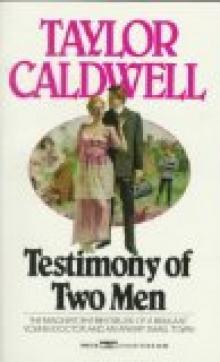 Testimony of Two Men
Testimony of Two Men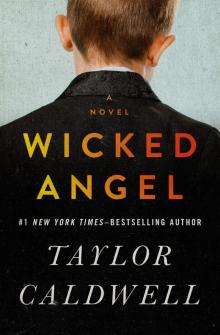 Wicked Angel
Wicked Angel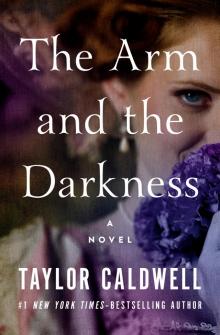 The Arm and the Darkness
The Arm and the Darkness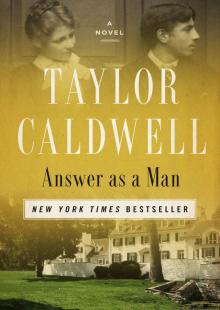 Answer as a Man
Answer as a Man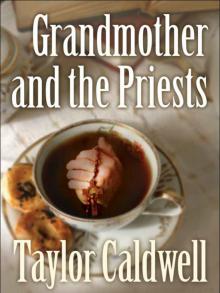 Grandmother and the Priests
Grandmother and the Priests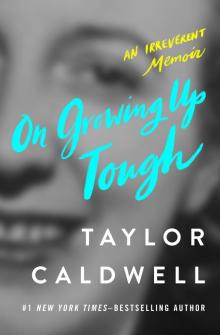 On Growing Up Tough: An Irreverent Memoir
On Growing Up Tough: An Irreverent Memoir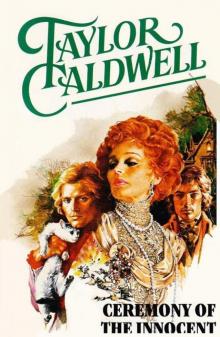 Ceremony of the Innocent
Ceremony of the Innocent The Listener
The Listener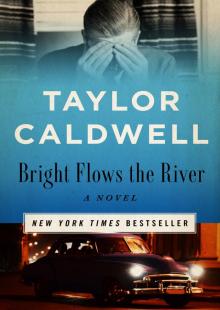 Bright Flows the River
Bright Flows the River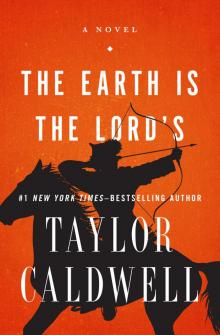 The Earth Is the Lord's
The Earth Is the Lord's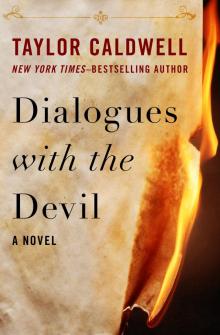 Dialogues With the Devil
Dialogues With the Devil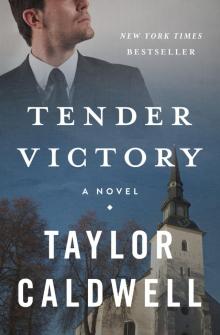 A Tender Victory
A Tender Victory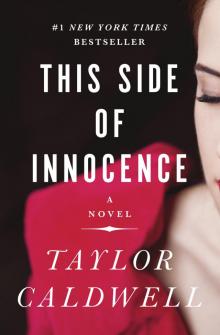 This Side of Innocence
This Side of Innocence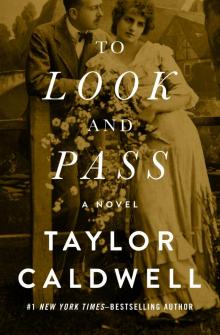 To Look and Pass
To Look and Pass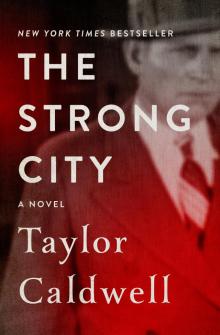 The Strong City
The Strong City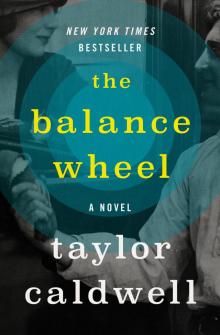 Balance Wheel
Balance Wheel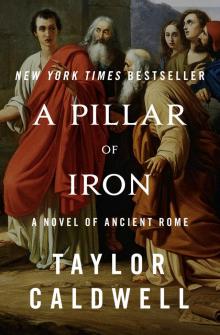 A Pillar of Iron: A Novel of Ancient Rome
A Pillar of Iron: A Novel of Ancient Rome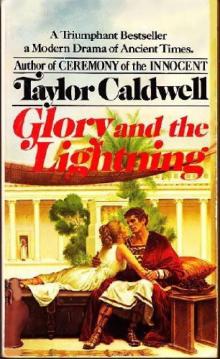 Glory and the Lightning
Glory and the Lightning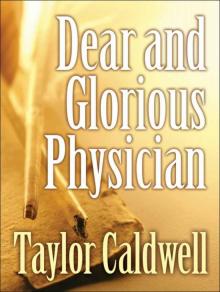 Dear and Glorious Physician
Dear and Glorious Physician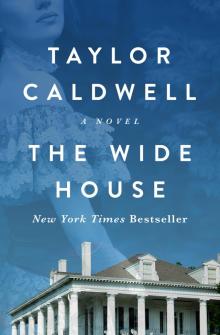 The Wide House
The Wide House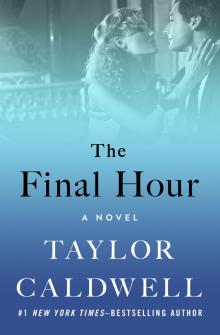 The Final Hour
The Final Hour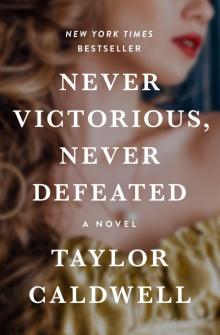 Never Victorious, Never Defeated
Never Victorious, Never Defeated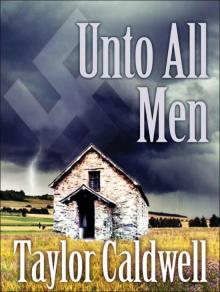 Unto All Men
Unto All Men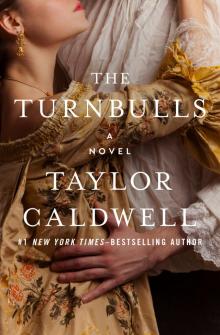 The Turnbulls
The Turnbulls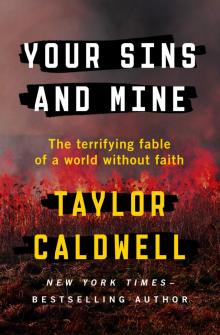 Your Sins and Mine: The Terrifying Fable of a World Without Faith
Your Sins and Mine: The Terrifying Fable of a World Without Faith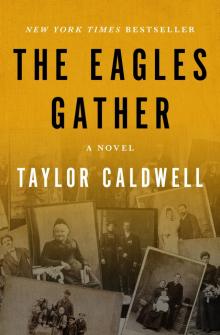 The Eagles Gather
The Eagles Gather Let Love Come Last
Let Love Come Last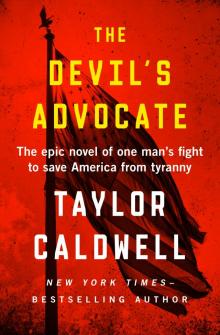 The Devil's Advocate: The Epic Novel of One Man's Fight to Save America From Tyranny
The Devil's Advocate: The Epic Novel of One Man's Fight to Save America From Tyranny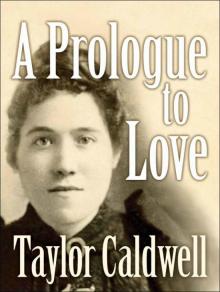 A Prologue to Love
A Prologue to Love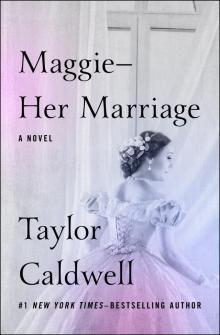 Maggie: Her Marriage
Maggie: Her Marriage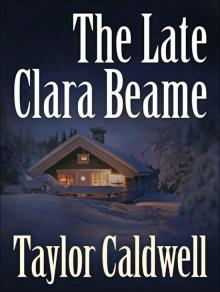 The Late Clara Beame
The Late Clara Beame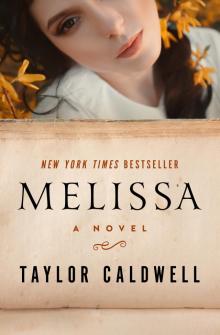 Melissa
Melissa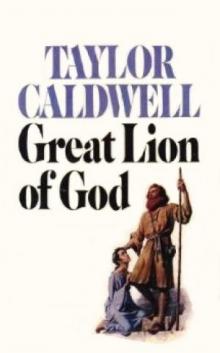 Great Lion of God
Great Lion of God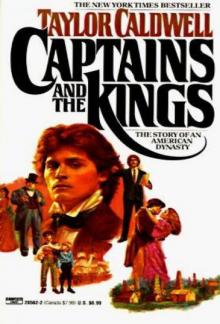 Captains and the Kings
Captains and the Kings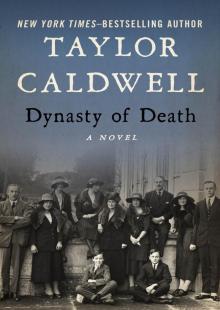 Dynasty of Death
Dynasty of Death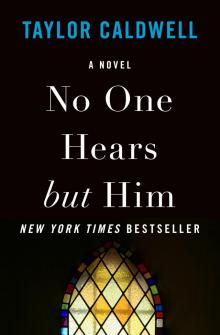 No One Hears but Him
No One Hears but Him The Sound of Thunder
The Sound of Thunder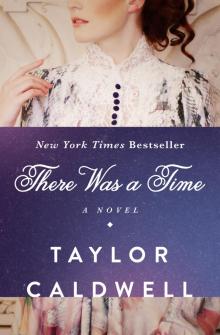 There Was a Time
There Was a Time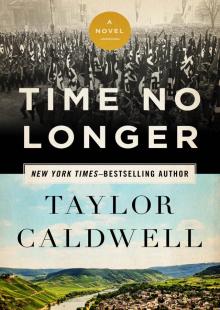 Time No Longer
Time No Longer I, Judas
I, Judas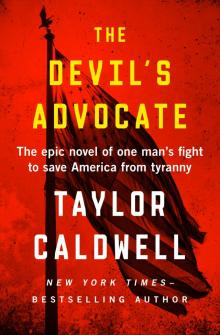 The Devil's Advocate
The Devil's Advocate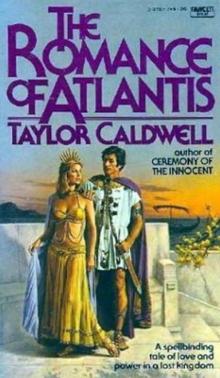 The Romance of Atlantis
The Romance of Atlantis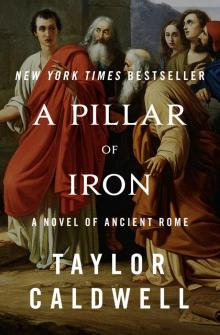 A Pillar of Iron
A Pillar of Iron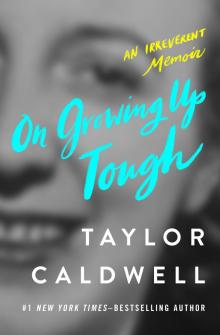 On Growing Up Tough
On Growing Up Tough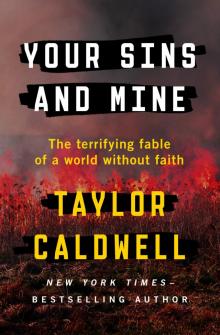 Your Sins and Mine
Your Sins and Mine